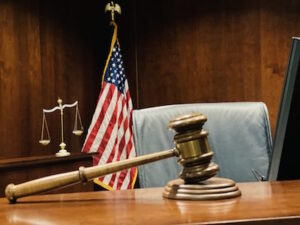05 Oct How To Move Expert Deposition Video Into Evidence
Mastering the Use of Expert Deposition Videos in Court
Expert witnesses are a valuable component of many court cases. Their testimony can provide critical insights and context, helping juries and judges reach informed decisions. However, the limitations of traditional testimony have led many legal professionals to explore alternative approaches, such as using expert deposition videos in court.
Expert deposition videos capture the testimony of an expert witness before trial, which can be played in court in lieu of live testimony. This strategy offers several advantages, including the ability to show a witness’s demeanor, body language, and vocal intonation. These factors can play a key role in how a jury or judge perceives a witness’s credibility and can be particularly effective in complex cases where deposition videos may help clarify complicated concepts.
In this blog, we’ll discuss the benefits of using expert deposition videos in court, how to create compelling deposition videos, and best practices for presenting them in trial.
The Benefits of Using Expert Deposition Videos in Court
There are several key benefits of using expert deposition videos in court. Emmet Flood, a former special counsel to the president of the United States, noted that deposition videos can be effectively used to cross-examine witnesses. When a witness gives inconsistent answers or shows other signs of dishonesty, a skilled attorney can force the witness to explain those discrepancies.
Deposition videos can be a useful resource for judges, who may need to refer back to key testimony during deliberations. Because deposition videos are pre-recorded, they can be played multiple times without the risk of a witness misremembering or changing their testimony.
Finally, deposition videos can be more efficient than live testimony. They enable legal teams to avoid the scheduling challenges and costs associated with live testimony. In some cases, they may allow teams to wrap up their case more quickly.
Rule 702: The Gatekeeper Rule
Rule 702 is like a gatekeeper; it ensures that any expert testimony is reliable and relevant. This rule is the basis for introducing expert deposition videos. Before these videos can be shown to a jury, the judge must make sure they’re trustworthy and connected to the case.
In addition, authentication is proving that the expert deposition video is real and accurate. Lawyers need to confirm where the video came from, when it was made, and if anything changed. Following authentication rules removes doubts about the video’s truthfulness.
Making An Expert Deposition Video Ready for Court
Now, let’s look at practical steps for using expert deposition videos effectively in court.
- Quality Check: Clear and Accurate Videos. The videos must be clear and accurate to be accepted in court. If the sound or picture is not good, it can confuse the jury and make people doubt the video. Lawyers should work with video experts to make sure the recording is top-notch, including clear audio, visuals, and a proper recording of any evidence.
- Video Expert Help. Sometimes, having a video expert testify about how the video was made can help. This makes the video more believable and answers any questions from the other side. The expert can explain the steps taken to record, store, and show the video, making it more reliable.
- Keeping Things in Order. Proving the video’s journey from recording to court is vital. Lawyers need to document every step, from who recorded it to where it was stored. Any gaps or problems in this process can make the video look untrustworthy. Using digital forensics, like timestamps and secure storage, can help keep the video’s integrity intact.
Tackling Problems When Trying To Move Expert Deposition Video Into Evidence
Even with a well-prepared video, there might be challenges. Lawyers need to be ready to solve these problems to make sure the video is accepted in court.
Opposing lawyers might say the statements in the video are hearsay—meaning they are out-of-court statements offered for the truth of the matter. Lawyers can argue that expert opinions, like the ones in the video, are often an exception to the hearsay rule.
To make expert opinions more reliable, lawyers should ask detailed questions during the deposition. This helps show the expert’s qualifications, method, and why they have a certain opinion. A well-documented deposition makes the expert look more trustworthy and provides a strong reason to show the video in court.
Sometimes, the judge might exclude evidence if its value is not worth the risk of being unfair. Lawyers should show the video’s importance and argue against any unfair harm it might cause.
Time To Use Expert Deposition Videos in Court
After all the preparations, the final step is showing the video in court and convincing the judge it should be accepted. Here are a few tips to make this successful.
- Early Planning. Before the trial, lawyers can file motions to decide what evidence can be shown, including expert deposition videos. This helps address potential problems early and makes the trial smoother. Well-argued motions set the stage for a successful use of expert deposition videos during the trial.
- Visual Help: Demonstrative Aids. To make expert deposition videos more persuasive, lawyers can use visuals like timelines and charts. These help explain complex ideas, making it easier for the jury to understand. Using these aids not only makes the video more acceptable but also helps the jury get the case better.
- Leveraging Technology for Seamless Presentation. In the modern courtroom, technology plays a pivotal role in delivering a compelling presentation. Attorneys can leverage multimedia platforms to seamlessly integrate expert deposition videos into their case strategy. This involves using presentation software, such as trial presentation programs, to synchronize the video with key points in the legal argument. A well-coordinated multimedia presentation not only enhances the jury’s comprehension but also underscores the professionalism of the legal team.
- Interactive Transcripts for Judicial Clarity. To further amplify the impact of expert deposition videos, attorneys can provide interactive transcripts alongside the video presentation. These transcripts, synchronized with the video timeline, allow judges and jurors to follow the spoken words in real-time. This not only aids in comprehension but also facilitates a deeper understanding of complex expert opinions.
- Accessibility Considerations. Incorporating accessibility features, such as closed captions, ensures that expert deposition videos can be comprehended by individuals with hearing impairments. Courts increasingly recognize the importance of inclusivity, and attorneys who proactively address accessibility concerns contribute to a fair and equitable legal process.
Navigating Cross-Examination
While the presentation of expert deposition videos can be a powerful advocacy tool, attorneys must be prepared to navigate challenges during cross-examination. Opposing counsel may attempt to cast doubt on the video’s authenticity or question the expert’s credibility. Proactively addressing these challenges involves thorough preparation and strategic planning.
Attorneys should conduct comprehensive preparation sessions with their expert witnesses to anticipate potential lines of questioning during cross-examination. This not only fortifies the expert’s confidence but also equips them to respond effectively to challenges to the video’s admissibility. By addressing potential weaknesses head-on, attorneys can preemptively diffuse attempts to undermine the video’s evidentiary value.
Conclusion
Expert deposition videos are an increasingly valuable and effective tool for conveying expert testimony in court. By creating meticulously crafted, high-quality videos and strategically utilizing them during trial proceedings, legal teams can present compelling evidence that can significantly impact the outcome of a case. Whether you’re a novice considering the incorporation of expert deposition videos or a seasoned practitioner seeking to refine your existing strategy, the best practices outlined in this blog will equip you with the knowledge and insights needed to achieve unparalleled success.
With a comprehensive understanding of how to move expert deposition video into evidence, you can confidently navigate the complex legal landscape and maximize the impact of expert testimony on the adjudication process.
Related Questions
Can any deposition video be presented as evidence in court?
Not all deposition videos are automatically admissible; they must meet specific criteria outlined in legal frameworks.
Are there specific formats required for submission?
Courts often prefer commonly used video formats, and compatibility with their systems is crucial.
How can I ensure the authenticity of deposition videos?
Implementing time stamps, maintaining a chain of custody, and obtaining expert opinions contribute to authenticity.
What role do expert witnesses play in presenting deposition videos?
Expert witnesses can provide context, enhance credibility, and narrate crucial elements within the deposition.
How do I address concerns about privacy in deposition videos?
Effective redaction methods and adherence to privacy laws are essential in handling deposition videos.
What are the potential consequences of misusing deposition videos?
Misuse can lead to legal ramifications, emphasizing the importance of ethical considerations








